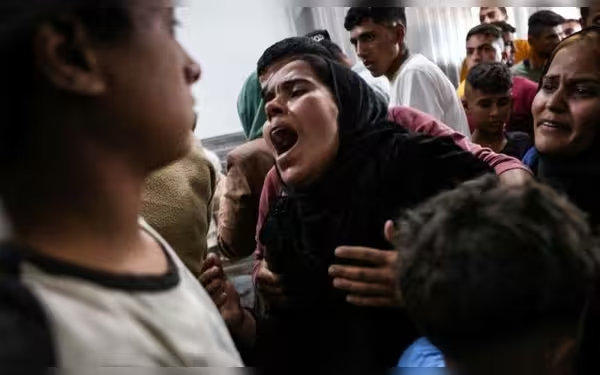Saturday, November 16, 2024 07:33 PM
Israel Strikes Lebanon and Gaza as Netanyahu Inspects Northern Border
- Netanyahu visits northern border amid renewed airstrikes.
- Over 1,940 casualties reported in Lebanon since conflict reignited.
- Gaza faces critical humanitarian crisis with rising death toll.
 Image Credits: brecorder
Image Credits: brecorderIsrael intensifies airstrikes in Lebanon and Gaza as Netanyahu visits the northern border, escalating the ongoing conflict and humanitarian crisis.
In recent weeks, the conflict between Israel and Hezbollah has escalated dramatically, leading to a series of intense military operations in both Lebanon and Gaza. The situation has become increasingly dire, with significant casualties reported on both sides. Prime Minister Benjamin Netanyahu's visit to Israel's northern border on Sunday coincided with renewed airstrikes in Lebanon, highlighting the ongoing tensions in the region.
On Sunday, Israel launched multiple airstrikes targeting Hezbollah positions in eastern Lebanon, following a warning that it would continue to strike these locations. Netanyahu emphasized the need to push Hezbollah back beyond the Litani River and to respond firmly to any attacks against Israel. His statements came as Israel's military reported that over 100 projectiles were fired from Lebanon into Israeli territory, with some intercepted and others landing in unpopulated areas.
The conflict has roots in a series of exchanges of fire that escalated significantly after September 23, when Israel intensified its air raids in response to Hezbollah's actions, which they claim are in support of Hamas. The ongoing war has resulted in a tragic loss of life, with more than 1,940 people reported dead in Lebanon since the conflict reignited.
In Lebanon, the health ministry reported casualties from Israeli strikes, including three fatalities and several injuries in Haret Saida, a densely populated area. Additional strikes were reported in Ghaziyeh and near a hospital in Tebnine, causing severe damage and injuries. Notably, these attacks did not come with prior warnings for civilians to evacuate, raising concerns about the safety of non-combatants in the region.
As the conflict continues, Hezbollah released a video showcasing an underground facility, indicating their preparedness for ongoing hostilities. The war has not only affected military personnel but has also taken a heavy toll on civilians, with reports indicating that Israel's military operations have resulted in over 43,000 deaths in Gaza, the majority of whom are civilians.
In Gaza, the situation remains critical, with Israeli airstrikes reported to have killed at least 30 people on Sunday alone. The humanitarian crisis is exacerbated by Israel's recent ban on the United Nations Relief and Works Agency (UNRWA), which provides essential aid to Palestinian refugees. This ban, if enforced, could severely impact humanitarian efforts in Gaza, where many are already struggling to survive amidst the ongoing violence.
The international community watches closely as tensions rise, with fears of a broader conflict involving Iran and its allies. Iran's President has hinted at a potential ceasefire that could influence the intensity of their response, while the U.S. has deployed military reinforcements in the region as a warning to Iran.
As the situation unfolds, it is crucial for the global community to advocate for peace and humanitarian support for those affected by the conflict. The ongoing violence not only devastates lives but also deepens the cycle of hatred and retaliation. A concerted effort towards dialogue and understanding is essential to pave the way for a lasting resolution to this tragic conflict.













